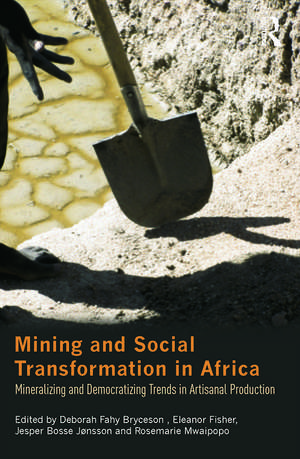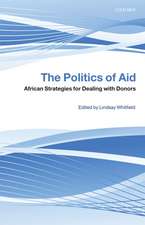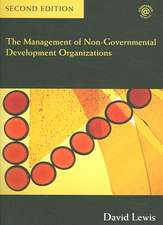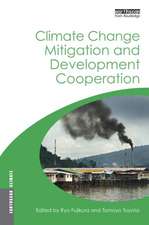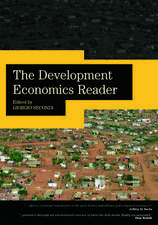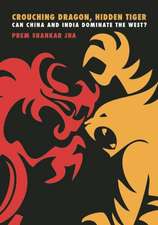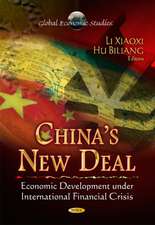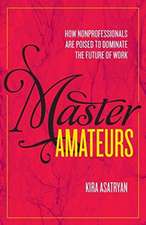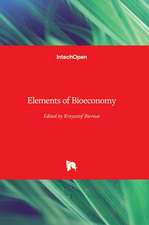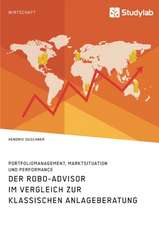Mining and Social Transformation in Africa: Mineralizing and Democratizing Trends in Artisanal Production: Routledge Studies in Development and Society
Editat de Deborah Fahy Bryceson, Eleanor Fisher, Jesper Bosse Jønsson, Rosemarie Mwaipopoen Limba Engleză Paperback – 28 apr 2014
While a burgeoning literature is acknowledging the spread of artisanal mining, this book is the first to probe its societal impact and potential for extending economic opportunity and participatory forms of democracy.
Delineating the paradoxes of artisanal miners working alongside the expansion of large-scale mining investment in Africa, Mining and Social Transformation in Africa concentrates on the Tanzanian experience. Written by authors with fresh research insights, focus is placed on how artisanal mining is configured in relation to local, regional and national mining investments and social class differentiation. The work lives and associated lifestyles of miners and residents of mining settlements are brought to the fore, asking where this historical interlude is taking them and their communities in the future. The question of value transfers out of the artisanal mining sector, value capture by elites and changing configurations of gender, age and class differentiation, all arise.
| Toate formatele și edițiile | Preț | Express |
|---|---|---|
| Paperback (1) | 464.54 lei 6-8 săpt. | |
| Taylor & Francis – 28 apr 2014 | 464.54 lei 6-8 săpt. | |
| Hardback (1) | 1059.48 lei 6-8 săpt. | |
| Taylor & Francis – 4 oct 2013 | 1059.48 lei 6-8 săpt. |
Din seria Routledge Studies in Development and Society
- 9%
 Preț: 1006.79 lei
Preț: 1006.79 lei -
 Preț: 298.75 lei
Preț: 298.75 lei -
 Preț: 311.41 lei
Preț: 311.41 lei -
 Preț: 353.18 lei
Preț: 353.18 lei -
 Preț: 431.73 lei
Preț: 431.73 lei -
 Preț: 434.63 lei
Preț: 434.63 lei - 28%
 Preț: 791.64 lei
Preț: 791.64 lei - 18%
 Preț: 1058.52 lei
Preț: 1058.52 lei -
 Preț: 411.42 lei
Preț: 411.42 lei - 28%
 Preț: 820.32 lei
Preț: 820.32 lei -
 Preț: 480.44 lei
Preț: 480.44 lei - 28%
 Preț: 823.81 lei
Preț: 823.81 lei - 18%
 Preț: 275.88 lei
Preț: 275.88 lei - 28%
 Preț: 876.21 lei
Preț: 876.21 lei - 18%
 Preț: 1064.98 lei
Preț: 1064.98 lei -
 Preț: 486.42 lei
Preț: 486.42 lei - 16%
 Preț: 314.79 lei
Preț: 314.79 lei -
 Preț: 413.18 lei
Preț: 413.18 lei - 18%
 Preț: 1069.23 lei
Preț: 1069.23 lei - 18%
 Preț: 1276.52 lei
Preț: 1276.52 lei - 18%
 Preț: 1059.48 lei
Preț: 1059.48 lei -
 Preț: 437.13 lei
Preț: 437.13 lei -
 Preț: 389.70 lei
Preț: 389.70 lei -
 Preț: 407.19 lei
Preț: 407.19 lei -
 Preț: 433.48 lei
Preț: 433.48 lei - 28%
 Preț: 823.17 lei
Preț: 823.17 lei -
 Preț: 366.46 lei
Preț: 366.46 lei - 18%
 Preț: 1059.48 lei
Preț: 1059.48 lei - 18%
 Preț: 1057.89 lei
Preț: 1057.89 lei - 18%
 Preț: 1108.37 lei
Preț: 1108.37 lei - 18%
 Preț: 1062.26 lei
Preț: 1062.26 lei -
 Preț: 446.37 lei
Preț: 446.37 lei - 19%
 Preț: 234.90 lei
Preț: 234.90 lei - 18%
 Preț: 1056.00 lei
Preț: 1056.00 lei -
 Preț: 432.29 lei
Preț: 432.29 lei - 25%
 Preț: 852.88 lei
Preț: 852.88 lei
Preț: 464.54 lei
Nou
Puncte Express: 697
Preț estimativ în valută:
88.89€ • 96.86$ • 74.90£
88.89€ • 96.86$ • 74.90£
Carte tipărită la comandă
Livrare economică 23 aprilie-07 mai
Preluare comenzi: 021 569.72.76
Specificații
ISBN-13: 9780415709729
ISBN-10: 0415709725
Pagini: 232
Dimensiuni: 156 x 234 x 15 mm
Greutate: 0.34 kg
Ediția:1
Editura: Taylor & Francis
Colecția Routledge
Seria Routledge Studies in Development and Society
Locul publicării:Oxford, United Kingdom
ISBN-10: 0415709725
Pagini: 232
Dimensiuni: 156 x 234 x 15 mm
Greutate: 0.34 kg
Ediția:1
Editura: Taylor & Francis
Colecția Routledge
Seria Routledge Studies in Development and Society
Locul publicării:Oxford, United Kingdom
Public țintă
PostgraduateCuprins
1. Introduction: Africa's New Mining Era and the Rise of an Artisanal Mining Social Practice Part 1: Miners' Agency and Social Relations 2. Going for Gold: Miners' Mobility and Motivation 3. Pursuing an Artisanal Mining Career: Downwards to Success 4. Loosely-woven Love: Sexuality and Wifestyles in Gold-Mining Settlements 5. Beyond Belief: Mining, Magic and Murder in Sukumaland Part 2: Mining Communities and Social Organizational Constructs 6. Property, Kin and the Social in Neoliberal Artisanal Mining 7. Ubeshi: Negotiating Artisanal and Large-scale Co-existence in Diamond Mining Part 3: Environmental, Trade, Regulatory and Development Policy Issues 8. Hazards of the Trade: Occupational and Environmental Adversities of Artisanal Mining 9. Handling Uncertainty: Policy and Practice Among Artisanal Gold Miners 10. The Ethical Turn in Artisanal Mining Policy: Issues and Implications for Fairtrade Gold 11. The Politics of Foreign Direct Investment: What Future for Artisanal Mining? Part 4: Conclusion 12. Artisanal Miners as a New Social Force
Descriere
While an expanding literature has documented the economic upsurge of artisanal mining, this book is the first to explore its societal impact in detail. It demonstrates that, as a mode of mineral production, artisanal mining has the potential to be far more democratic and emancipating than preceding modes. It explores the paradoxes of this mode of mineral production alongside the expansion of large-scale mining investment in Africa, focussing on the Tanzanian experience. It considers how artisanal mining is configured in relation to local, regional and national mining investments, wealth accumulation and social class differentiation emanating from it. It focuses on work lives, mobility, and associated lifestyles of miners and people in mining settlements, asking where this historical interlude is taking them, their communities and countries in the future. The question of value transfers out of the artisanal mining sector, value capture by elites and changing configurations of gender, age and class differentiation all arise.
